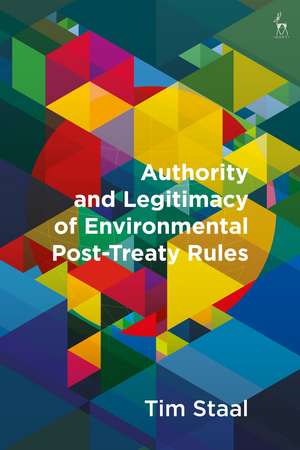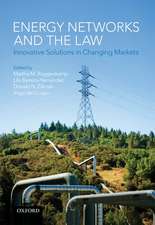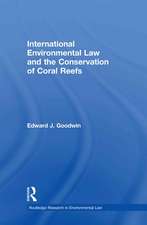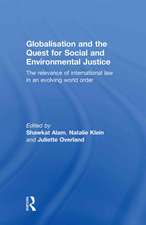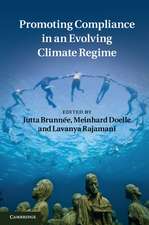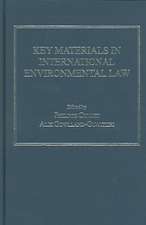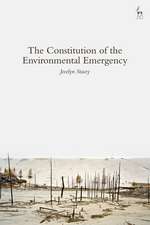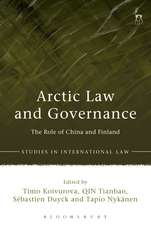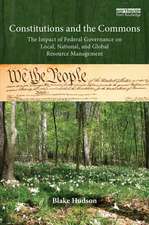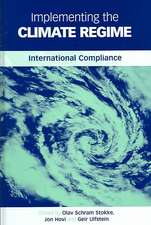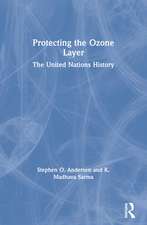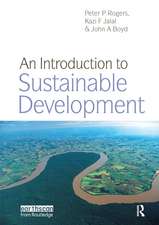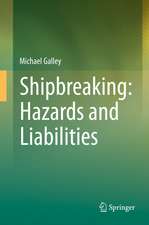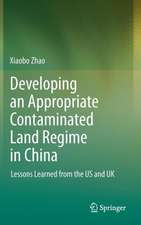Authority and Legitimacy of Environmental Post-Treaty Rules
Autor Tim Staalen Limba Engleză Hardback – 15 mai 2019
| Toate formatele și edițiile | Preț | Express |
|---|---|---|
| Paperback (1) | 272.69 lei 6-8 săpt. | |
| Bloomsbury Publishing – 16 dec 2020 | 272.69 lei 6-8 săpt. | |
| Hardback (1) | 571.66 lei 6-8 săpt. | |
| Bloomsbury Publishing – 15 mai 2019 | 571.66 lei 6-8 săpt. |
Preț: 571.66 lei
Preț vechi: 817.61 lei
-30% Nou
Puncte Express: 857
Preț estimativ în valută:
109.38€ • 114.51$ • 90.51£
109.38€ • 114.51$ • 90.51£
Carte tipărită la comandă
Livrare economică 07-21 aprilie
Preluare comenzi: 021 569.72.76
Specificații
ISBN-13: 9781509925568
ISBN-10: 1509925562
Pagini: 328
Dimensiuni: 156 x 234 x 28 mm
Greutate: 0.66 kg
Editura: Bloomsbury Publishing
Colecția Hart Publishing
Locul publicării:London, United Kingdom
ISBN-10: 1509925562
Pagini: 328
Dimensiuni: 156 x 234 x 28 mm
Greutate: 0.66 kg
Editura: Bloomsbury Publishing
Colecția Hart Publishing
Locul publicării:London, United Kingdom
Caracteristici
Highlights ambiguities and weakness in the system, alerting scholars and practitioners to potential vulnerabilities
Notă biografică
Tim Staal is part-time Associate Professor of Public International Law at the University of Amsterdam and freelance investigative journalist.
Cuprins
PART IENVIRONMENTAL POST-TREATY RULES AND THEIR AUTHORITY1. Environmental Post-Treaty Rules: Concept and Context A. Multilateral Environmental Agreements B. Plenary Treaty Meetings C. Rule Making by Plenary Treaty Meetings D. The Concept of Post-Treaty Rules E. The Normative Relationship between MEAs and Environmental Post-Treaty Rules 2. The Compartmentalised Authority of Environmental Post-Treaty Rules A. Investigating Authority: Three Normative Orders B. Eternal Interpretation: The Ramsar Convention and CITES C. Closing the Gap: The Montreal and Kyoto Protocols D. Conclusion PART IITHE SOURCES OF THE AUTHORITY OF ENVIRONMENTAL POST-TREATY RULES3. The Silence of the Enabling Clauses: Delegated Authority and the Doctrine of Sources A. PTRs as International Delegated Acts B. PTRs' Delegated Authority According to the Sources of International Law C. PTRs' Delegated Authority in the Internal Normative Orders of MEAs D. National Legal Orders E. Conclusion 4. 'Taking into Account': Interpretive Authority and Wording A. PTRs as Interpretive Agreements in the International Legal OrderB. PTRs as Interpretive Agreements in National Courts C. The Effect of Wording on PTRs' Interpretive Authority D. Conclusion 5. Invisible Authority: Social Legitimacy and Social Pressures A. Social Legitimacy and Authority B. Social Legitimacy and Social Pressures in the Three Normative Orders C. Conclusion PART IIICRITICAL PERSPECTIVES ON THE AUTHORITY OF ENVIRONMENTAL POST-TREATY RULES6. Vulnerable Authority: Discretion in Domestic Implementation and Violation of Procedural Principles A. Is Authority Based on Social Legitimacy Different? B. Wide Governmental Discretion C. Infringement of Fundamental Procedural Principles D. Conclusion 7. Challenges to the Normative Legitimacy of Environmental Post-Treaty Rules A. Input Legitimacy B. Output Legitimacy C. Conclusion
